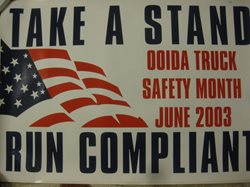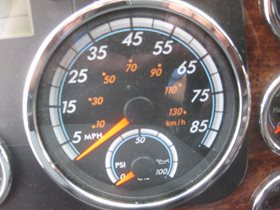
I want to write a story in order to illustrate an issue regarding “Hours of Service” in the trucking industry. For drivers and trucking companies alike,” the issue is wasted and uncompensated time at the shipper and the consignee”.
Let’s begin the scenario by imagining that you have a rusty bolt with a ¾ inch head. The bolt needs to be removed from an object in order to complete a repair. The problem is that I currently do not have a ¾ wrench or socket to remove the bolt. I’m at a location by myself without any tools or transportation to obtain what I need to get the task accomplished. In a few minutes, a person comes by and asks me how they can help? My answer is that I need a ¾ inch wrench or socket in order to remove the bolt. The person has a combination wrench which will aid me in removing the bolt. When they hand me the wrench, I notice it’s a bit short and I’m thinking to myself that I may not have enough leverage to loosen the bolt. I put the wrench onto the bolt and push with all my strength and it doesn’t budge.
not have a ¾ wrench or socket to remove the bolt. I’m at a location by myself without any tools or transportation to obtain what I need to get the task accomplished. In a few minutes, a person comes by and asks me how they can help? My answer is that I need a ¾ inch wrench or socket in order to remove the bolt. The person has a combination wrench which will aid me in removing the bolt. When they hand me the wrench, I notice it’s a bit short and I’m thinking to myself that I may not have enough leverage to loosen the bolt. I put the wrench onto the bolt and push with all my strength and it doesn’t budge.
 With our first attempt not working, the person goes back to see what other tools he may have to assist me. He returned with a sledge hammer. At this point I’m thinking how is a sledge hammer going help me remove this bolt? I think to myself that maybe if I hit the bolt with the head of the hammer with a few sharp blows, maybe it will jar the rust loose, allowing me to remove the bolt with the wrench. I strike the head of the bolt with a few sharp precise blows and place the wrench on the head of the bolt and yet again… no luck.
With our first attempt not working, the person goes back to see what other tools he may have to assist me. He returned with a sledge hammer. At this point I’m thinking how is a sledge hammer going help me remove this bolt? I think to myself that maybe if I hit the bolt with the head of the hammer with a few sharp blows, maybe it will jar the rust loose, allowing me to remove the bolt with the wrench. I strike the head of the bolt with a few sharp precise blows and place the wrench on the head of the bolt and yet again… no luck.
 I’m scratching my head at this point, trying to figure out a solution to this problem. The man who is helping says to me “go ahead and hit the end of the wrench with the sledge hammer to see if the bolt will begin to turn”. I don’t want to do this as it may damage his wrench. He’s not worried about this and tells me to “go ahead and do it”. With the second strike upon the end of the wrench, the head of the bolt begins to turn. I set the sledge hammer down and begin to turn the bolt out with only the wrench. It’s difficult to turn but I manage to remove the rusty bolt. Now, I can complete my task.
I’m scratching my head at this point, trying to figure out a solution to this problem. The man who is helping says to me “go ahead and hit the end of the wrench with the sledge hammer to see if the bolt will begin to turn”. I don’t want to do this as it may damage his wrench. He’s not worried about this and tells me to “go ahead and do it”. With the second strike upon the end of the wrench, the head of the bolt begins to turn. I set the sledge hammer down and begin to turn the bolt out with only the wrench. It’s difficult to turn but I manage to remove the rusty bolt. Now, I can complete my task.
You may say… how does this compare to the “Hours of Service” issue? During the listening sessions which were held by the FMCSA, there was one issue which was brought to attention by those who participated. The point made was how excessive waiting time at the shipper/consignee contributed to driver fatigue. While this is a good point to share with the FMCSA, ultimately they have no control over the shipper/consignee. They do however have authority over the trucking industry. Initially, the FMCSA handed us the 14 hour clock, which couldn’t be stopped to deal with this problem. The 14 hour clock was very similar to the wrench in the scenario above. By reducing flexibility, if a driver was detained at a dock, he would no longer have the ability to make up for this time in order to arrive at the delivery dock at a specified time. This should have caused all carriers to have detention time built into their contracts to make up for lost time at the dock.

Much like the wrench which didn’t offer enough leverage to loosen the bolt, the 14 hour rule did not cure the problem. With most carriers recording their HOS on paper and with the level of competition that exists in our industry, it was much easier to adjust our log book than to confront the shipper/consignee. What should have happened was for everyone to stick together and not accept loads without detention time built into the contract. OOIDA understood the effects that could be achieved if everyone ran compliant as they promoted a campaign years ago on this very issue. There was little participation for their efforts and once again like the story above, the bolt did not budge.
With the issue of detention time, it seems we are powerless and this is a huge frustration for many. Just maybe we have one more tool at our disposal to jar this stubborn bolt lose once and for all. Could this tool be the sledge hammer in the scenario above? The tool I’m referring to is the EOBR, which is now referred to as the (Electronic Logging Device) or ELD.

Just recently, I spoke with a driver friend who visited the United Kingdom. He shared that over in Europe they have mandatory detention time. My ears perked up and I asked him… is it really mandatory? If so, what is the rate of compensation and who determines this. Upon further discussion, I learned that the government doesn’t regulate detention time however they simply put it into their contracts. Typically, after 15 minutes… they begin charging a detention fee. We discussed what is different from the U.S and Europe in the way this issue is handled. The main difference is that they have been using ELD’S for many years. This leaves them only 3 choices. They can make less money when detained, go out of business if detained too often or charge a fee for their time detained. It seems as this compares to when fuel prices in the U.S. sky rocketed and we all knew we needed to do something quick or we were finished. Fuel surcharge in the U.S. today is a common practice in contracts just as it’s the normal and accepted practice of the detention fee being charged in the United Kingdom.
I have no way of knowing if the intention of the FMCSA in its rulemaking was to address detention time. However, the above illustration is just an alternative way to look at the HOS issue and determine the best strategy to make it work for everyone.
| Could time finally have a value ... |
or will it just be about the miles ? |
 |
 |